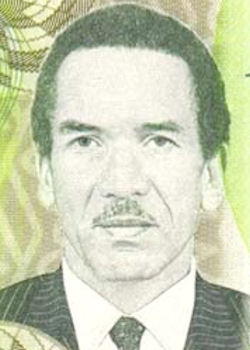Lieutenant General Seretse Khama Ian Khama
 Festus Mogae in turn stepped down in early 2008 and Ian Khama became President. BDP governments have been notably technocratic – both Masire and Mogae were Ministers of Finance, and the latter was a professional economist – which has contributed to sound fiscal policies.
Festus Mogae in turn stepped down in early 2008 and Ian Khama became President. BDP governments have been notably technocratic – both Masire and Mogae were Ministers of Finance, and the latter was a professional economist – which has contributed to sound fiscal policies.
National elections were held on 16 October 2009. The BDP continued its unbroken record of continuous governance since independence in 1966 by winning 45 of the 57 available seats. The Botswana National Front (BNF) won six seats and the Botswana Congress Party won four seats, while the Botswana Alliance Movement (BAM) and an independent candidate took one each.
His Excellency the President, Lieutenant General Seretse Khama Ian Khama, is first born son of Botswana's founder President, the late Sir Seretse Khama, and his revered wife the late Lady Ruth Khama. He was born on the 27th of February 1953 in Surrey, England as the second of four siblings, with an elder sister Jacqueline, and two younger twin brothers, Tshekedi and Anthony. The location of the President's birth was due to the fact that his parents had been forced into political exile, being barred by the then colonial Government from residing in Botswana.
In April 1998 Lieutenant General Khama retired from the Botswana Defence Force and joined politics. As a member of the ruling Botswana Democratic Party, he was appointed Minister for Presidential Affairs and Public Administration. In July that year, he won the Serowe North Constituency by-election and became its Member of Parliament. He was thereafter nominated for Vice President by President Festus Mogae; his nomination being subsequently endorsed by Parliament. In addition to being Vice President Khama retained his Ministerial Portfolio at Presidential Affairs.
In the October 1999 general election, Khama again contested the Serowe North Constituency and won; he was again nominated and endorsed by Parliament as Vice President. In October 2004 he contested the General Elections in the Serowe North West Constituency and was the only parliamentary candidate unopposed. He was also once more endorsed as Vice President. In July 2003 Khama was further elected Chairman of the ruling Botswana Democratic Party.
Khama apparently has little patience for dissent or criticism. Khama was brought into BDP politics from the military in 1998 with the specific dual mandate of lending the Khama luster to the party and of being the enforcer: ensuring that ministries got their deliverables out in time. Khama,s career experience can be described as long on commanding; short on the give-and-take of political accommodation. While this approach could increase productivity in Botswana's lethargic bureaucracy, it could also short-circuit constructive dialogue and undermine checks on government power.
Khama is the oldest son of Botswana’s first post-independence leader, Seretse Khama. The younger Khama’s critics have accused him of trying to establish a family dynasty. In 2014, the president drew fire from his own party when he attempted to have his younger brother, Tshekedi, installed as vice president. Tshekedi is one of several candidates rumored to be in the running as the new president’s deputy. The Khama family also occupies a number of key positions inside and adjacent to the government. Tshekedi is minister of tourism. His twin, Anthony, is a businessman who was embroiled in a 2015 scandal in which his company was allegedly given favor in a major defense contract. Their cousin is the defense minister and oversees the nation’s intelligence agency. Another cousin is a top ruling party adviser and once served as ambassador to Sweden. And his ex-wife, who kept the Khama name, heads the nation’s De Beers diamond franchise.
Botswana’s president drew attention for urging long-time African leaders to loosen their grip on power: first, Zimbabwe’s Robert Mugabe, then Joseph Kabila of the Democratic Republic of Congo. Now, it was his turn. President Ian Khama stepped down 31 March 2018 to make way for his vice president, exactly a decade - to the day - after he became president of the diamond-rich Southern African nation. Current Vice President Mokgweetsi Masisi took his place. Botswana law restricts the president to serving two five-year terms, and provides for the vice president to automatically fill the post should it become vacant. The National Assembly will elect a new president after elections scheduled for October 2019.
|
NEWSLETTER
|
| Join the GlobalSecurity.org mailing list |
|
|
|

